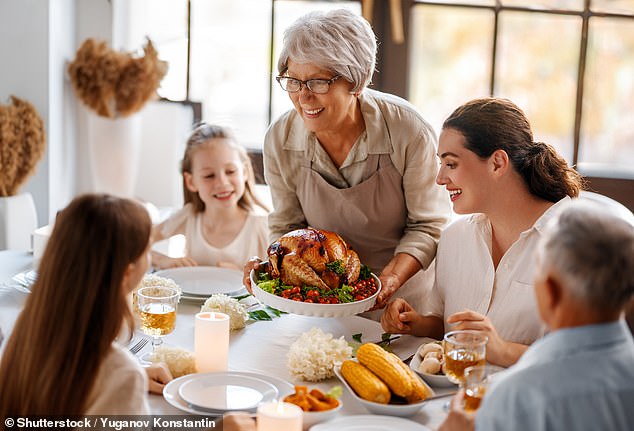Scientists reveal why you SHOULD NOT wash your raw turkey this Thanksgiving
It’s a meal that millions of Americans look forward to all year long.
But if you’re in charge of Thanksgiving dinner tomorrow, make sure you heed the new advice from the Centers for Disease Control and Prevention (CDC).
The CDC has revealed exactly how to safely cook your holiday turkey.
This includes the best way to store, thaw, handle, cook and even reheat your bird.
Contrary to popular belief, experts say you shouldn’t wash your raw turkey as this can spread germs to other foods in your kitchen, increasing the risk of food poisoning.
“Old recipes and family cooking traditions may tell you to continue this practice, but it could make you and your family sick,” the CDC explained.
‘Poultry juice can spread throughout the kitchen and contaminate other food, utensils and countertops.’
Despite this advice, a 2020 survey found that more than three-quarters of Americans wash or rinse their turkey before cooking it.
Contrary to popular belief, experts say you shouldn’t wash your raw turkey as this can spread germs to other foods in your kitchen, increasing the risk of food poisoning (stock image)

It’s a meal that millions of Americans look forward to all year long. But if you’re in charge of tomorrow’s Thanksgiving dinner, make sure you heed the new advice from the Centers for Disease Control and Prevention (stock image)
Like raw chicken, raw turkey can be contaminated with several germs that make you sick, including Salmonella, Clostridium perfringens and Campylobacter.
“Outbreaks of Clostridium perfringens occur most often in November and December,” the CDC explained.
“Many of these outbreaks have been linked to foods commonly served during the holiday season, such as turkey and roast beef.”
While you may think that washing your turkey can help remove germs, this is unfortunately not the case.
The water droplets released during the washing process can even spread germs in your kitchen.
This is especially a problem if you have ready-to-eat foods near your sink.
‘Be especially careful to keep raw foods away from ready-to-eat foods such as bread, salad and fruit,’ the NHS advises.
“These foods aren’t cooked before you eat them, so germs that land on them aren’t killed.”
For the same reason, it is important that you always clean countertops, cutting boards, plates and cutlery after handling raw turkey.
And you should never use the same cutting board for raw poultry and prepared foods without washing it thoroughly in hot, soapy water.
If you’re hesitant to kick your poultry washing habit, Professor Enzo Palombo, professor of microbiology at Swinburne University of Technology, recommends doing it in a sink of water, rather than under a running tap.
“Use a paper towel to mop up liquids, throw the towel away, and clean up afterward,” he advised in an article for The conversation.
‘This will help reduce the risk of cross-contamination and keep the kitchen safe.’
